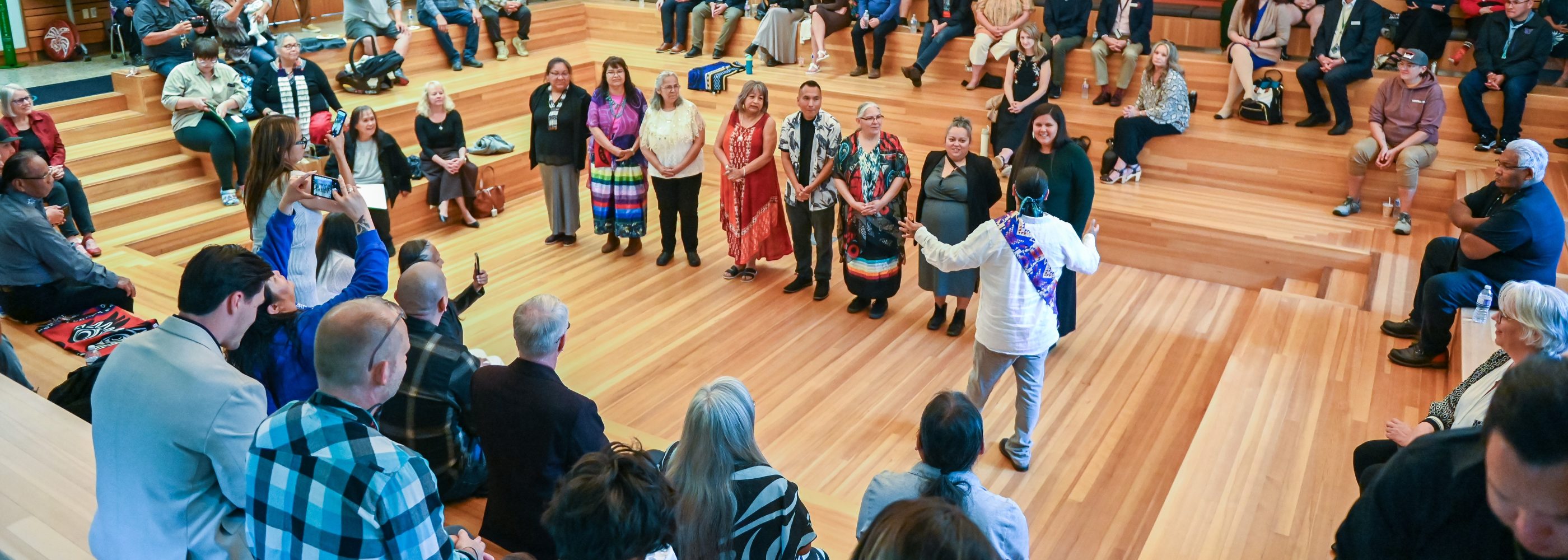Walking together toward Indigenization, decolonization, and reconciliation
Education carries both power and responsibility. In Canada’s history, education was used as a tool of colonization that caused deep harm to Indigenous Peoples. Universities now have an essential role to play in addressing that past and building a more just and inclusive future through Indigenization, decolonization, and reconciliation.
At the University of the Fraser Valley (UFV), our work is grounded in relationships with the Stó꞉lō people, the People of the River, on whose territory we live, learn, and work. The Stó꞉lō speak Halq’eméylem, and their enduring connection to their ancestral lands, waters, and resources continue to define their identity while serving as an example to all those who have come here from elsewhere. In partnership with Stó꞉lō Elders, Knowledge Givers, and communities, UFV is committed to shaping a university where the recognition of Indigenous rights is woven into all facets of research, scholarship, artistic work, and teaching.
When education is built on respect and partnership, it becomes a source of empowerment. Universities must acknowledge the colonial past and ongoing injustices as we work in relationship to contribute to resurgence within Indigenous communities and genuine reconciliation between Indigenous people and settler Canadians.
- Understanding the terms
- Indigenization at UFV
- Mandate and institutional commitments
- Program integration and student experience
- Research and community partnerships
- Your support matters
- Donation form
Understanding the terms
- Indigenization: Brings Indigenous ways of knowing, being, and doing into all aspects of university life through meaningful collaboration with Indigenous Peoples.
- Decolonization: Challenges and changes the colonial structures that have shaped education, creating space for Indigenous sovereignty, truth, and voice.
- Reconciliation: Restores relationships between Indigenous and non-Indigenous peoples through respect, learning, and shared commitment to a just future.
Supporting this work is an investment in transformative education. It helps ensure that UFV becomes a source of healing, understanding, and strength for all who call this land home.
Indigenization at UFV
At the University of the Fraser Valley (UFV), Indigenization is a living and evolving journey grounded in relationships with the Stó:lō and guided by the teachings of Stó:lō Elders, Knowledge Givers, and Indigenous leaders. UFV honours its relationship with the Stó:lō by working collaboratively to empower their stewardship of the land, and assisting in the rebuilding of their culture, language, and healthy communities.
Mandate and institutional commitments
UFV’s institutional commitments to Indigenization are embedded in its guiding frameworks and plans. Xwexwílmexwawt: UFV’s Indigenization Plan and dedication to the Truth and Reconciliation Commission’s Calls to Action anchor this work. These commitments are reflected throughout the Integrated Strategic Plan and Strategic Enrolment Management (SEM) Plan, ensuring that Indigenization is not a separate initiative but part of UFV’s foundation and identity as a university community.
Program integration and student experience
UFV’s classrooms, programs, and student supports reflect a growing integration of Indigenous knowledge and leadership. The Halq’eméylem language program celebrates the language of the Stó:lō people and connects learners with the teachings of this land. The Indigenous Student Centre (ISC) provides a welcoming space that fosters community, belonging, and support for Indigenous students. UFV also offers numerous Indigenous student bursaries that are available to support their academic pursuits.
Research and community partnerships
UFV is committed to collaborative research, scholarly, and artistic work that uplifts Indigenous voice, builds capacity within Stó:lō communities, and creates opportunities for co-creating new knowledge to guide society forward. Many of UFV’s Research Centres support Indigenous projects that are collaborative, community-driven, and responsive to Indigenous priorities. These initiatives foster dialogue, mutual learning, and research that contribute to wellness, understanding, and social change.
Some examples of community-engaged research:
Your support matters
Guided by respect and care, we are involved in collaborative projects and initiatives with the Stó:lō people and other Indigenous communities that ensure that Indigenous voices, knowledge, culture, and languages not only survive, but thrive into the future. Contributions to UFV are a powerful act of support and respect for the work of Indigenization, decolonization, and reconciliation.
Gifts to UFV provide vital support for the expansion of Indigenous-led programs, language revitalization initiatives, Indigenous student opportunities, and community partnerships developed with Indigenous leadership. Together we are building a university that upholds truth, respect, and mutual responsibility.
We welcome ongoing dialogue and connection as we continue this important journey together. If you would like to learn more, share your ideas, or explore ways to support this work, please reach out to us at giving@ufv.ca. Your engagement helps deepen relationships and create meaningful impact in partnership with Indigenous communities.

